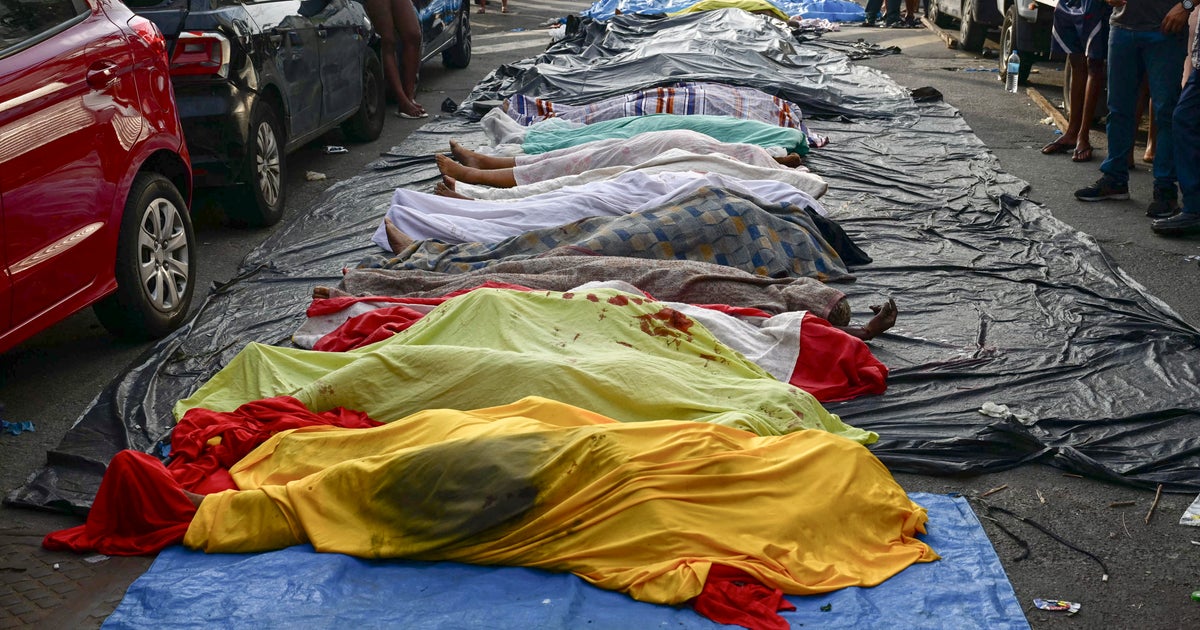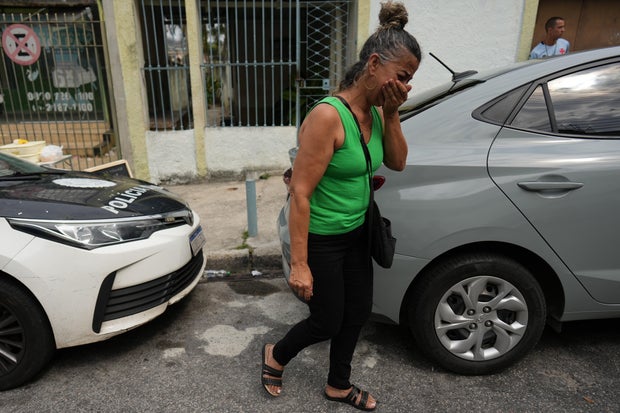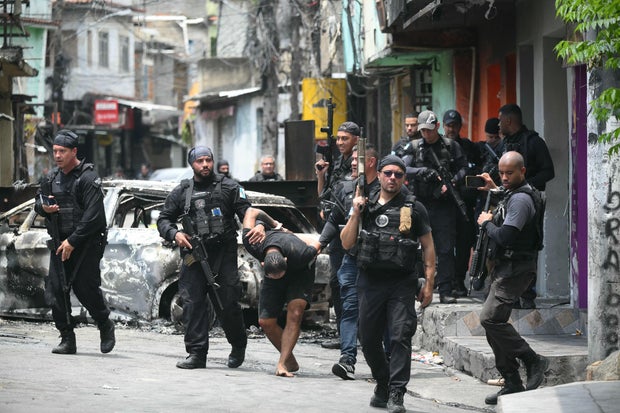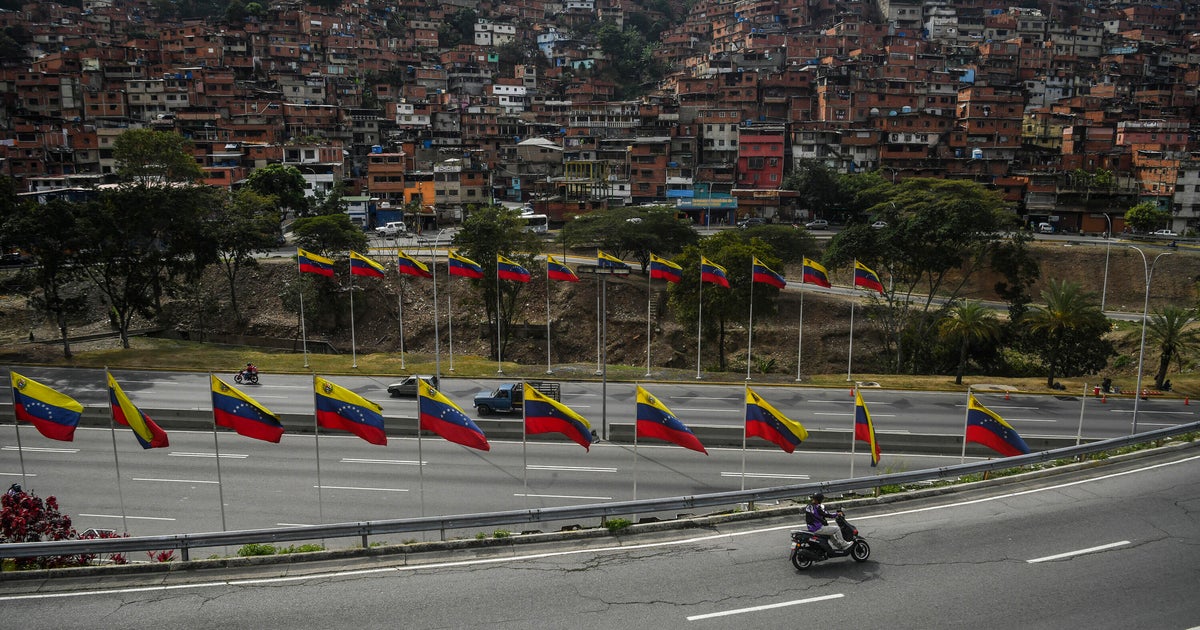Brazilian police raid leaves at least 119 dead, sparking protests and calls for murder and treachery

[ad_1]
The main attacks of the drug cartel are concentrated in the low-income neighborhood of Rio de Janeiro left at least 119 people dead Donvew is protesting the acquisition of power on Wednesday and is demanding that Rio’s governor step down.
The families of the dead have denounced what they describe as police killings, while the federal government has hailed the success of a powerful criminal group that has taken over large swaths of the city.
Most of the residents of the Faveles gathered in front of the government headquarters proclaiming “killers!” And around the flags of Brazil covered in red paint, a day after the most deadly attack in Rio and hours after families and citizens who have built many corpses in the street of one of the targeted communities to show the magnitude of the operation.
BBC News has confirmed several videos showing that many bodies have been removed from the Rio market, in its North Penha district.
Questions immediately arose when the death toll and the condition of the bodies, and the reports of injuries and wounds. The Supreme Court of Brazil, prosecutors and lawmakers asked Rio State Gov. Claudio Castro provides detailed information on performance.
“This was a massacre,” said Barbara Barlosa, a homeschooler from Penha’s FavelAvel, one of the two largest communities targeted by police operations. He said his son was killed in a previous operation in Penha.
Pablo Porcinula / AFP via Getty Images
“Do we have the death penalty? Stop killing us,” said boat activists, many residents. Many citizens have come to Rio poor, north of Guanabara Palace on motorcycles.
The charging of 115 suspects and four police officers killed was an increase from what the authorities initially said was 6,500 suspected police officers of nearly 2,500 forces in the favelas of Penha and Clowlo de Alemoo.
Felipe Curi, the secretary of police in Rio State, told a news conference that the bodies of additional suspects were found in a wooded area where he said he was wearing security forces. He said local residents removed clothes and equipment from the bodies, which will be investigated as disturbing evidence.
“These people from Woods, they are armed with camouflage clothing, masks and weapons. Now many of them are seen wearing underwear or clothes, as if they are not pretending to be dangerous,” said Curi.
Earlier on Wednesday, in the Penha area, residents surrounded many corpses – they were collected from trucks and demonstrated “killings” and “justice” before finding the bodies.
“They can take them to jail, why kill them like this? Many of them were alive and they wanted help,” resident Elisangela Silva Santos, 50, said, “Yes they are smugglers, but they are people.”
“They hit my son’s throat”
A day after a police operation paralyzed the city, residents of the Cologno da Penha Faveli found many bodies in the forest on the edge of its range, including the one that had won, AFP reporters saw.
“They strangled my son, cut his neck, and hung his head on a tree like a medal,” said 19-year-old Raquel Tomas, who was found collapsed.
“Then they took my son out without giving him a chance to defend himself. He was killed,” he told AFP, his voice trembling.
“Everyone deserves a second chance. During the operation, the police should do their job, arrest the suspects, but they don’t,” Tomas added.
Silvia left / ap
Lawyer Albino Pereira Neto, who represents three families who lost relatives, told the other bodies of “fanatic marks” and that some of those killed were arrested.
Others were ‘killed in cold blood,’ he said.
“We saw people killed”
The tally of arrested suspects stood at 113 – UP from 81 previously identified, said Curi. The federal government said about 90 guns and more than a ton of drugs.
The police and the army have launched attacks with helicopters, armored vehicles and on foot, targeting the red gangs. They drew guns and other firearms from gang members, sparking scenes of chaos across the city on Tuesday. Schools in the affected areas were closed, university classes were closed, and roads were closed with buses used as barriers.
Rafael Sweres, a journalist who covers crime in Rio, told BBC News Brasil that the red command has been annoying in Rio in recent years, and he returned the field he had missed his rivals, the command of the first money.
Many shops remained closed Wednesday morning in Penha, where local activist REUll Santiago said part of the group found about 15 bodies before dawn.
“We saw people killed: shot in the back, shot wounds, people arrested. This level of torture, this hatred,” said Santiago.
The Supreme Court Justice Alexandre de Moraes sent Castro to provide information about the operation of the police and to organize a hearing with the governor of the state and the police of Millie next in Rio.
The Senate Human Rights Commission said they are asking for clarification from the Rio State government. At the time, prosecutors in Rio asked Castro to provide detailed information about the operation and evidence that there were no dangerous methods to achieve his goals.
Mauro Pimentel / AFP via Getty Images
And the federal prosecutor’s office asked the Forensic Medical Center to ensure that the Autopsy reports contain full descriptions and photographic and color radiographic documentation of all injuries.
Castro said on Tuesday that Rio was fighting a war on “Narco-terrorism,” a term used by the Trump administration in its campaign to combat drug trafficking in Latin America.
On Wednesday, Castro called the operation “a failure,” despite the deaths of four police officers.
The government of Rio State said that the suspects who were killed were ambushed by the police.
Rio has been the scene of deadly police brutality for decades. In March 2005, 29 people were killed in Rio Fluminense in Rio’s Baixada district, and in May 2021, 28 were killed in Jacarezin Faavera.
But the scale and danger of Tuesday’s operation is unprecedented. Non-governmental organizations and the UN human rights body soon raised concerns about the high number of reported deaths and called for an investigation.
“We fully understand the challenges of dealing with violent and well-organized groups like the Red Command,” said human rights spokeswoman Marta Burchado.
But Brazil must “break this cycle of extreme brutality and ensure that law enforcement activities are in line with international standards regarding the use of force,” he said, adding that the body is calling for a full police reform.
Late Wednesday, President Luiz Inácio Lula da Silva said X had ordered the Minister of Justice and the Director General of the State Police to meet with the Rio meeting.
Brazil cannot accept that organized crime “continues to destroy families, oppress citizens, and spread drugs and violence in every home,” he said.
The stated objectives of the operation captured the leaders and limited the expansion of the soil of the red command group, which has increased its control over the faavels in recent years.
Gang members are said to have targeted police with at least one drone. Rio de Janeiro’s federal government shared a video on X of what appears to show drones being shot down from the sky.
“Drones dropping bombs are now a practice used by highly armed criminal groups,” Carlos Solar of the Royal United Services Institute told BBC News.
Rio is “alone in this fight”
Gov. Castro, from the conservative and opposition Liberal Party, said Tuesday that Rio is ‘alone in this fight.’ He said the federal government should provide more support to the fight against crime – a swipe at Lula’s left-wing administration.
His comments were challenged by the Ministry of Justice, which responded to requests from the Rio State Government to send troops to the state, renewing its presence 11 times.
Gleisi Hoffmann, the LULA Administration’s liaison with the Parliament, agreed that more coordinated action was needed but it was shown in the recent breakdown in spending due to organized crime.
The Minister of Justice Ricardo Lewandowski said it was clearly a bloody and violent operation.
“We have to think whether this kind of action is compatible with the democratic law that passes everything,” he told reporters on Wednesday.
Gangs have grown their presence throughout Brazil in recent years, including in the Amazon rainforest.
Roberto Ucôa, from the Brazilian forum of the public security think tank, said that those gangs are right despite these types of operations, suggesting that they do not work.
“Killing more than 100 people like this will not help to reduce the increase of the red order. The dead will soon,” said Ucôa.






